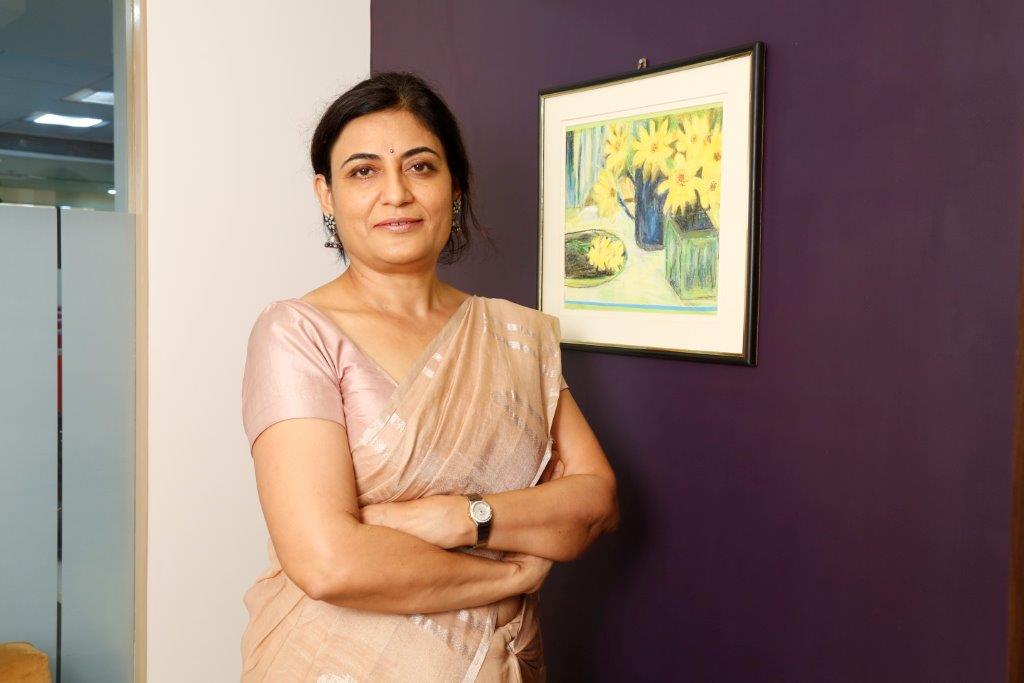She heads one of India’s largest multimedia conglomerates housing brands such as Dainik Jagran, Radio City, Mid-Day and Inquilab. Meet President of the Jagran Group Ltd, Apurva Purohit who has over three decades of experience in the media and entertainment industry. When she is not scaling businesses and mentoring, Purohit is a consummate writer and orator.
A prominent speaker at industry forums, organisations and educational institutions, she has been crusading for gender parity and actively speaks on societal issues such as mental health, climate destruction, and digital onslaught, among many others.
She has authored Lady, You’re not a Man: The Adventures of a Woman at Work and more recently Lady, You’re the Boss!. Thrive Global India caught up with Purohit to gain more insight to her thoughts. Presenting edited excerpts:
Thrive Global India: Have Indian organisations made progress towards gender parity at the workplace? What are the main issues yet to be addressed?
Apurva Purohit: While there have been numerous conversations around bridging the gender gap at workplaces, India is far from achieving it. According to a 2019 WEF report on gender gap, especially on economic participation, India ranks 112th out of the 154 countries. The proportion of women in the total labor force in India is only 27 per cent, less than four per cent are at senior leadership levels and less than 15 per cent women make it to company boards.
If the above numbers are anything to go by, there is some serious work required in this regard from an organisational and societal standpoint. Organisations need to promote a culture that fosters gender parity without any paternalistic biases. As it is, women lack self-confidence and constantly question their capabilities. We tend to maximise our mistakes and minimise our strengths. Men on the other hand find it easier to move on from their mistakes and celebrate every win. Which means that there is a greater need to encourage and motivate women to climb up that corporate ladder and make it to the corner office.
Also, our society as such has been very patriarchal in nature. A working woman is expected to manage both work and home affairs efficiently, where her male counterpart focuses only on providing for the family. For this perception to change there needs to be an intrinsic change at a societal level.
Of course, a lot of the onus, therefore, falls directly on women to make work a non-negotiable fixture in her life, and delegate responsibilities both at work and home,
TGI: How do you promote a culture of diversity and equality in your organisation?
AP: I think the most important thing you have to do is ensure that you have enough women role models at the top. The moment women see senior women around them, they feel emboldened and encouraged to strive for growth. In fact, strong professional networks help women bridge the confidence gap, which is key to leadership success.
A study by KPMG suggests that:
- 84 per cent women felt confident about what they could accomplish in life by having positive leadership role models.
- 67 per cent women reported that they had learned the most important lessons about leadership from other women
- 82 per cent working women believe access to and networking with female leaders will help them advance in their career.
- Unfortunately, as high as 67 per cent of women said they need more support building confidence to feel like they can be leaders.
I also believe that you have to treat women and men exactly the same. If due to paternalistic biases you give the easier jobs to women, or you don’t push them with tougher expectations, you end up ‘bonsai’ing them and preventing their future growth.
Also, having more women at leadership roles ensures that more women get hired across verticals and ranks at organisations. It’s like a self-fulfilling prophecy, a wonderfully positive cycle of affairs which creates a domino effect, one that ensures that there are more women at the workplace.
TGI: How would you describe your own leadership style or philosophy?
AP: I believe in the ethos of consistent commitment in everything I do. People trust leaders who live up to their commitments and thus we need to make sure that whatever we promise, we deliver. Slowly this becomes a value system in the organisation and any organisation which constantly delivers on its commitments to all stakeholders becomes a great organisation.
I also believe in tough love as a managerial style and ensuring that people are held accountable whilst practising empathy is a good working mode to adopt. I believe in providing feedback, however tough, albeit with empathy and equally believe in encouraging my team to think critically and question everything rather than simply agree to what is being said. I would trade an army of timorous followers for three brave warriors watching my back (though they may argue with me incessantly in private) any day!
TGI: What is your favourite de-stressing activity or getaway destination and why?
AP: As a getaway destination, Europe will always have a special place in my heart. I have already spent so many summers there, I’d go back in a heartbeat. On days when work gets very hectic or if I know I’ll be travelling extensively for work, I find my solace in books. I’m a voracious reader and prefer spending any free time I get, reading. I like watching all the older British crime serials like Inspector Morse, Endeavour, Midsomer Murders, Inspector Lynley Mysteries, etc.
TGI: Does sleep play a role in your overall well-being and performance? Do you have an evening routine that helps you unwind and sleep better?
AP: I’ve had issues with sleep for some time now and on some days, it does have an impact on my productivity. I’ve tried everything to deal with my sleep issues, from aromatherapy to sleeping pills to acupressure to a glass of wine. These only gave me passing relief. Melatonin was the most effective solution I found but taking it endlessly was hardly a viable solution. I started experimenting with smart mattresses, the ones which claim to sense your sleep movements and adjust accordingly to give you uninterrupted slumber. I have even tried apps like Headspace where Andy Puddicombe’s British accent has tried to put me to sleep. My yoga teacher has recommended mindfulness meditation and light stretching before sleeping. In addition to this I have consciously started ensuring I keep away all digital devices post 9 pm. Every night now, once I retire to my bedroom, I practise my regimen of mindfulness meditation and try to consciously switch off my mind from its overactive state.
TGI: How do you reframe setbacks or negative thoughts?
AP: The best way to handle negative thoughts is to practise gratitude. The moment you are able to focus your attention towards all the good things in your life and practise gratitude with respect to the Universe, Nature, God, etc, who have given you so much, you will find you are able to deal with setbacks.
TGI: What is the best professional advice you have ever received?
AP: Financial independence is the most important form of emancipation. You should never be financially dependent on anyone.
TGI: Could you share some ‘excellence’ habits that help you do well at work?
AP: I strongly believe the three habits that have helped me do well are a strong sense of personal accountability, of prioritising my goals and work schedule and, of having the right blend of strategy and implementation.
Personal accountability: We are responsible for both the good and bad that happens to us. We need to take complete control of our destiny and the destinies of people around us and hold ourselves accountable for every action and corresponding effect without passing the buck.
Prioritising: As leaders we need to be very clear about the foremost priority of our business/ project/ career or next meeting, I call this the F1. Trying to achieve multiple goals is part of the job, but we should know where and what our non-negotiable goals are. Many people understand focus but they don’t understand that sacrifice is the other face of focus. To focus on something we have to learn to let go of other things. Once we know what our F1 is, our implementation abilities and the choices we make improve dramatically.
Strategy and implementation bias: Many leaders understand strategy, however, find it very difficult to convert it to reality. For that you need to employ several tactics like converting the strategy to an implementation plan before jumping into action, of breaking the goals into do-able sub-goals , of figuring out the actual metrics of measurement which will ensure right results. I believe I do all this very well.
TGI: What is one thing most people don’t know about you, as a person?
AP: I am socially a very introverted and reticent person.


